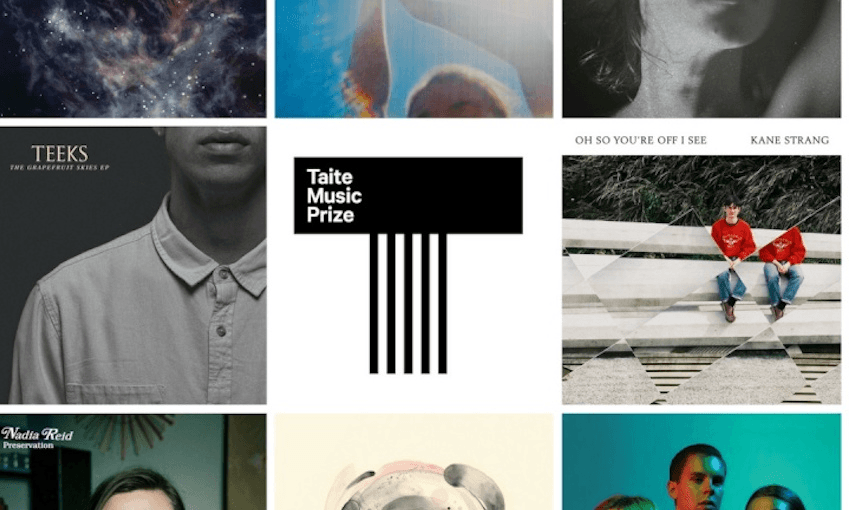Miriama Aoake looks at the Taite Music Prize finalists and asks: Why are most of the finalists white? And why do they nearly all have guitars?
The Taite Music Prize finalists for 2018 were announced today. Among them, the talent boasted by the finalists is unquestionable. The line-up is dominated by incredible women: Aldous Harding, Fazerdaze, Gussie and Lily of Mermaidens, Dianne of The Bads, and Nadia Reid. However, with the exception of Fazerdaze (Amelia Murray, who is part Indonesian) and the indomitable TEEKS (Ngāpuhi, Ngāi Te Rangi, Ngāti Ranginui), the list is lacking artists of colour and those who have emerged from a hip-hop or electronic tradition.
Why?
It isn’t as though Aotearoa is short of excellent hip-hop or electronic acts, or music made by people of colour. The issue seems to be that the process of nominating an act for the Taite Music Prize is a bureaucratic nightmare, leading to certain kinds of artists being nominated (and subsequently being finalists and winners) and others being shut out.
To be eligible, you must either be a member of Independent Music New Zealand (IMNZ) or pay a fee of $90+GST. Artist membership for independents and smaller labels for single releases is $86.25 annually. For larger labels, managers and artists with two or more releases and copyrights, the fee is $172.50 per year. IMNZ members can nominate up to three releases, with each additional nomination costing $50.
The finalist process relies primarily on the members of IMNZ. All IMNZ members, plus 50 non-IMNZ members rank their top ten albums from the works submitted. The finalists are then assented and labels are required to submit physical or digital copies to a ten-person panel, who will judge the music in its entirety: on originality, artistic merit, creativity, innovation and excellence, as well as physical packaging and album artwork. The judging panel meets to select a winner from the finalists, and the winner is announced at the Taite Music Prize event in April.
The economic barriers are immediately identifiable, but the main concern is access. The nomination process seems to suggest a preference for nominees who are on labels. Half of the finalists belong to Flying Nun, the champion of the ‘Dunedin Sound’ which, unsurprisingly, has traditionally been – and remains – very white. The initial nomination fees for independent artists (distinct from artists on independent labels) are disproportionate and unaffordable for many wishing to nominate themselves. It’s basically a gamble.
This raises some questions: Does the process, with intentions to foster ‘community’, actually work to exclude independent artists? If music is easily consumed digitally, why does the Taite Prize not also work to democratise the process by shifting online, eradicating fees and other barriers within the nomination criteria? Where is the inclusion, where is the equity?
But perhaps it’s not the nomination process that is to blame for the lack of diversity among the finalists, perhaps it is more reflective of the IMNZ membership. Comparisons can be drawn with the Grammy Recording Academy, which also criticised for its lack of diversity, though primarily regarding gender, which isn’t at issue with the Taite Prize – more than half the finalists are women or include women in prominent roles. If the body of your membership doesn’t reflect the multiplicity of experiences, realities and narratives within Aotearoa, it cannot be said to be “a true reflection of the best local recordings,” as IMNZ general manager Dylan Pellett says of the finalists, because you haven’t considered all the possibilities.
If the barriers to access remain in place the Taite Music Prize is at risk of becoming complicit in the power dynamics that privilege some, while excluding many who are disqualified before they even enter. For example, the big omission from this year’s list of nominees is SWIDT’s Stoneyhunga, by consensus one of the best New Zealand albums of 2017. Of course, it could be the result of a conscious boycott on the artist’s part, which would be warranted. Either way, SWIDT’s absence is glaring.
This is not to discredit the achievements of the finalists, who are all incredible in their own realm. But perhaps in the years to come, IMNZ can look to improve and democratise the process, so as to avoid the appearance of an exclusive club for label-affiliated musicians and industry heads. There is an abundance of exceptional talent cascading from the faucet of hip-hop and electronic music in Aotearoa – often without the backing of a local label – that we ignore, misinterpret and undermine, relegating to a mixed box labelled ‘Urban’. Whether it’s the Vodafone Music Awards or the Taite Prize, we fail to properly acknowledge the achievements of artists of colour who regularly kick down creative doors and shatter expectations. We constantly shift the bar and make it harder and harder for these artists to succeed, when we should be embracing and celebrating their phenomenal success.
Correction: An earlier version of this post stated that you must be a member of IMNZ to enter but that non-members could enter for a fee. This is inconsistent and has been corrected.
The Spinoff’s music content is brought to you by our friends at Spark, a major sponsor of Auckland City Limits. Listen to all the music you love on Spotify Premium, it’s free on all Spark’s Pay Monthly Mobile plans. Sign up and start listening today.
